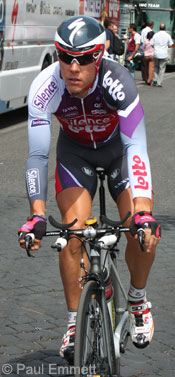 Philippe Gilbert has given his full backing to the whereabouts system which makes out of competition testing possible, saying that supporting it is a matter of ‘organisation and professionalism’.
Philippe Gilbert has given his full backing to the whereabouts system which makes out of competition testing possible, saying that supporting it is a matter of ‘organisation and professionalism’.
The Belgian, who has spoken out against doping in the past, said that he has no problems with satisfying this requirement, and sees it as a necessary part of his job.
“I started to fill out these forms in 2004 when I entered the best 50 riders in the world,” the Omega Pharma-Lotto rider told Dhnet.be. “At the time this was done by fax, as the internet site was in its infancy.
“Even if it is not always easy to implement, I never had any trouble completing these forms. That’s part of the job and is therefore something to be respected, period.”
Riders have to give their whereabouts three months in advance, and any changes have to be notified. “It is true that when I’m travelling, it is not necessarily easy to find an internet connection to updated the latest upheaval in a very busy agenda,” he said. However he feels this is something that is easily rectified. “But a quick phone call to the secretary of the team solves the problem.
“This is my opinion at least, a matter of organisation and professionalism. For someone who is concerned about the future of his sport, this is a mere administrative formality.”
Cycling has had tighter controls that many other sports, and measures by WADA to extend the whereabouts into other areas has met with resistance. A number of international sports people including Rafael Nadal and Tom Boonen have criticised the whereabouts system, and Boonen is one of several Belgian athletes who are part of a court case challenging it.
In December, a separate Belgian court action saw US Open semi-finalist Yanina Wickmayer and her Belgian compatriot Xavier Malisse successfully appeal their one-year suspension for missing anti-doping tests.
The ruling, which poses a challenge to WADA’s whereabouts system, is being appealed to CAS.
Gilbert is clearly in favour of the tests, recognising that they protect both the image of a sport and also help to prevent abuse of doping substances.
He said that while cycling has a negative image after many scandals, that other sports can learn from its example. “Despite what some would say and write about cycling, I think the riders are, in general, extremely conscientious and applied on this subject,” he explained.
“Recent events are sufficient to show that once we establish some rules in other sports, that changes things rapidly. Although they are often the most criticized, many athletes would do well to emulate the sense of responsibility of cyclists.”
The 27 year old took seven victories in 2009, including a stunning four-win run in the Coppa Sabatini, Paris-Tours, the Tour of Piemonte and the Tour of Lombardy.